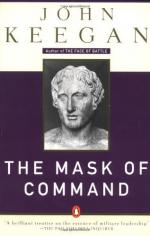
|
| Name: _________________________ | Period: ___________________ |
This test consists of 5 multiple choice questions, 5 short answer questions, and 10 short essay questions.
Multiple Choice Questions
1. The Macedonian army was different from that of the _______________ in that it was essentially a militia in which the citizens had the right to bear arms.
(a) Americans.
(b) Romans.
(c) Persians.
(d) Greeks.
2. To what did the French set fire?
(a) A textiles plant.
(b) A chateau.
(c) A large business.
(d) A barn.
3. The spears were ________________ feet long and quite heavy; therefore, they were not used in battle per se, although they might be seen on the periphery.
(a) Ten.
(b) Five.
(c) Twenty.
(d) Eighteen.
4. The first piece of news about Napoleon's attack on the Prussians reached Wellington while he was preparing to do what?
(a) Eat dinner.
(b) Attend a ball.
(c) Plan an attack.
(d) Go to sleep.
5. The French were determined to throw a web of alliances over the principalities as a sign of allegiance to whom?
(a) The Moghuls.
(b) The Russians.
(c) The Chinese.
(d) The Swedes.
Short Answer Questions
1. Why did many of the other soldiers view Wellington with some jealousy?
2. Awards and titles were also lavished on Wellington by whom?
3. Alexander could, however, claim an abundance of natural resources, livestock, grains, and fertile lands. The latter was due in part to what?
4. Aristotle would become known as one of the world's most brilliant philosophers and the founding father of ___________.
5. One of the biggest benefits of Wellington's scarce idle time is what?
Short Essay Questions
1. How does Wellington's war record and number of battles compare to Alexander the Great's?
2. Compare the upbringing of both Wellington and Alexander.
3. How does Alexander look as he rides into battle? Why is this important?
4. How does Wellington's life reveal that he was a man of great persistence, resilience, and fortitude?
5. To whom does Keegan compare Alexander the Great in Chapter One? What is the outcome of this comparison?
6. Describe Alexander's relationship with his men. What does this reveal about his character?
7. Describe Alexander's education.
8. Why might the author use the word "abstractedly" to describe Wellington?
9. Why were other soldiers jealous of Wellington? Should they have been jealous? Why or why not?
10. Describe the army Alexander inherited from his father.
|
This section contains 1,125 words (approx. 4 pages at 300 words per page) |

|




